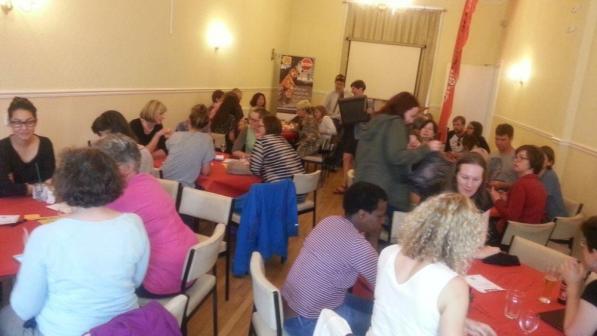Women's Cycling Forum discusses inclusive cycling

Saturday 14 June saw the first meeting of the Women's Cycling Forum in Edinburgh. My reasons for being there were many, but primarily I was invited to present a short summary of the ICC (Inclusive Cycle Champions) programme currently being run in the English regions and also funded by the Big Lottery. The programme is a being conducted in partnership with cycling projects.
So at around 6pm, we all met at the Ukrainian meeting house in Edinburgh for the Forum's first session organised by Suzanne Forup, of CTC, and Sally Hinchcliffe, of Pedal on Parliament, and funded by the Big Lottery.
There were lots of very interesting presentations from a variety of women on a range of subjects - from actively flouting the Australian helmet laws to getting under 5s learning to ride in Scotland and chic raincoats ... .
What is ICC?
The programme is about increasing access to adaptive cycles for people with additional needs and a large part of its remit is to increase the numbers and diversity of people accessing cycling as an activity. There are four CTC ICCs, one in each region - North West, South West, North East and South East, and we are also working on developing a regional cluster of mutually supportive and very individual projects.
I am working with a wide range of projects, some small and based in a local park, others larger and working from nature reserves, forests and country parks. Many run from sports centres where people ride around the athletics track, and some are based in SEN school settings. However, the one factor that unites them all is that they offer an opportunity to experience riding a bike regardless of ability and in a fun and enjoyable way.
Inclusive cycling in a wider context
One of the main issues discussed at the round table session with a small but very interesting group was the difficulties of enjoying cycling in an everyday context for people with adaptive cycles - for example, the practicalities of riding a trike or quad on the road to get to the shops or even for leisure on the NCN.
It was felt that people needed to be more tolerant of others who travel more slowly, but nevertheless have equal rights to ride. This was compounded by problems with potholes and steep cambers that have a profound effect on the behaviour of a trike. We discussed the difficulties of riding in a more segregated context too, e.g. negotiating barriers and A frames on cycle paths as well as a lack of decent dropped kerbs. In other words, many issues are very similar to those experienced by two-wheeled riders and parents travelling with children!
We also felt that there was not sufficient awareness of the opportunities to access cycling for those with additional needs or in some places, access to bikes and facilities. There was a feeling that it was difficult to achieve progression from riding in a park or athletics track environment, and that a change in attitude to road use would be required or decent segregated routes that accommodate all of the more vulnerable cyclists.
We looked at the range of people that might need access to an adaptive cycle and how we could raise awareness in those individuals and groups. There are many national organisations working with people post stroke or heart surgery or who have visual or auditory impairments, the elderly, people with weight management issues and lots of others with additional needs who may need access to adaptive cycles.
What can we do?
Well, we decided that raising awareness was a key factor in addressing most of these issues, and that we could all help by looking for local groups to contact to tell them about the opportunities that exist - we have already set up a web based directory of the projects we are currently working with at CTC. We also decided to contact those responsible for road infrastructure and cycle paths to make them aware of the difficulties that some people have with current designs. We could also look for our nearest inclusive cycling activity and help out if possible.
Put simply, we all felt that more tolerance was needed to ensure that cycling is a fully inclusive activity.

